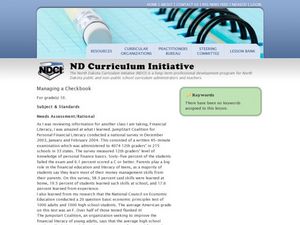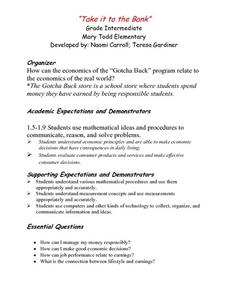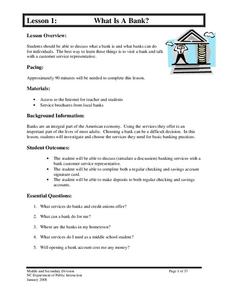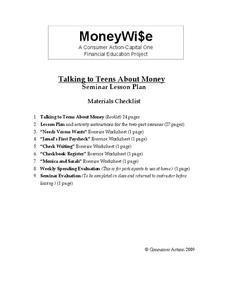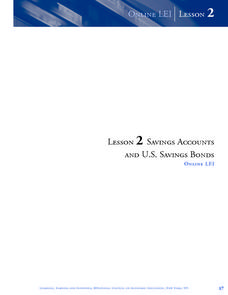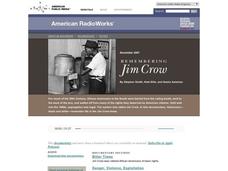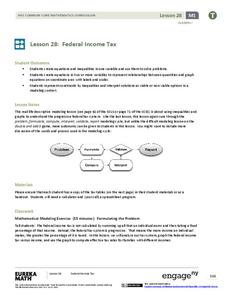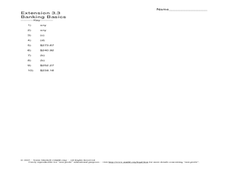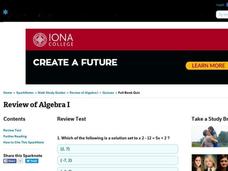Curated OER
Managing a Checkbook
How do grown ups do it? Teach your upper graders the ins and outs of personal finance by having them use their algebra skills to balance a checkbook. They examine the financial side of math, set up a checking account, and balance their...
Curated OER
Take It To the Bank
Examine how the economics of a school store relate to real world economics. Elementary young scholars explore various websites, complete a Venn diagram, create a schedule of wages for the students, read the book "A Chair For My Mother"...
Curated OER
Account-Recording Adjusting/Closing Entries
Students explore adjusting and closing accounting entries. They complete an outline and post closing entries to their appropriate accounts. They prepare a Post Closing Trial Balance at the end of a fiscal period and complete online...
Curated OER
Account-Recording Adjusting/Close Entries for Service Business
High schoolers discover how to journal adjustments and post them into general ledger accounts. They explore what a post closing trial balance is and why it is prepared at the end of a fiscal period. They complete an outline and play...
Curated OER
Accounting
Students create bank reconciliation spreadsheet. For this algebra lesson, students discuss the basics about business, money and bank accounts. They use a bank reconciliation statement correctly.
Curated OER
Savings Accounts and Interest
First graders study money, banks, and getting interest on money. In this consumer math lesson plan, 1st graders listen to Stan and Jan Berenstain's, Berenstain Bears' Trouble With Money. They use the concepts in the book to discuss...
Council for Economic Education
Understanding a Balance Sheet
Read any financial website or book, and it is bound to discuss the words asset and liability. But what do these words actually mean to the class? The resource effectively explains by using multiple formats and techniques, including...
North Carolina Department of Public Instruction
What Is A Bank?
You're never too young to learn about banking and personal finance. Use a set of seven banking lessons to teach middle schoolers about checking and savings accounts, interest rates, loans and credit cards, and safety deposit boxes.
Consumer Action
Talking to Teens About Money
Your teenagers are probably very good at spending money, but how good are they at managing it? Teach class members about banking, checking accounts, interest rates, car insurance, and many other relevant concepts with a series of...
Curated OER
Lesson 2: Savings Accounts and U.S. Savings Bonds
Young scholars explore the importance of savings accounts and U.S. Savings Bonds. They study the concept of simple interest through a math activity.
Curated OER
Science in History Part I: the Abacus To the Modern Computer
In this math information worksheet, learners read one page factual accounts of the early math inventions of the abacus, the calculator and early computers. There are 40 questions to answer about the reading.
Curated OER
Cash Control Systems
Students are introduced to cash control systems including checking accounts, endorsing and writing checks. In groups, they define a bank statement and practice how to read them. To end the lesson, they discover how to create a petty...
Illustrative Mathematics
Bookstore Account
We use debt often to describe negative numbers and your learners will be able to see how it translates into math. They will be asked to go through a series of transactions and make simple equations for each one, following it with a...
Curated OER
Calculating Your GPA
Learners in grades 9-12 learn about their GPA. They learn what GPA stands for, how to calculate their own GPA and what it means for them in relation to their personal goals and for potential colleges.
EngageNY
Federal Income Tax
Introduce your class to the federal tax system through an algebraic lens. This resource asks pupils to examine the variable structure of the tax system based on income. Young accountants use equations, expressions, and inequalities to...
Curated OER
Banking Basics Extension 3.3
In this checking account register in the financial life of a teenager worksheet, students read and solve word problems. Students solve 10 problems.
Curated OER
Banking on Family
Students examine the meaning of a trust bank account. In this financial awareness lesson, students brainstorm ways they are trustworthy to their family and define the meaning of a trust bank account.
Curated OER
Review of Algebra I
Test your class with this online review. They determine the probability of a given situation, solve inequalities, systems of equations, and write numbers in scientific notation. This two-page worksheet contains approximately 60 problems.
Alabama Learning Exchange
I Know What You Did Last Summer: A Data Graphing Project
Young scholars participate in graphing data. In this graphing data instructional activity, students make a stem and leaf plot of their summer activities. Young scholars create numerous graphs on poster boards. Students discuss the...
Curated OER
Money Math Lessons for Life
An outstanding instructional activity on financial literacy is here for you. Learners are presented with six scenarios, then compute the amount of savings they will have in their accounts. They complete a series of exercises designed to...
Curated OER
Spending Money
Fourth graders become familiar with the ways people exchange goods and services. In this spending money lesson, 4th graders listen to a chapter from Henry and Beezus and record Henry's earnings and money spent. Students use correct...
EngageNY
Real-World Positive and Negative Numbers and Zero
Class members investigate how positive and negative numbers are useful in the real world. Individuals first read a short passage and identify terms indicating positive and negative numbers. They consider situations involving positive...
EngageNY
Percent Rate of Change
If mathematicians know the secret to compound interest, why aren't more of them rich? Young mathematicians explore compound interest with exponential functions in the twenty-seventh installment of a 35-part module. They calculate future...
Bowland
Fish Dish
Minimize the time it takes to create a fish dish. Scholars use their knowledge of time to devise an order that accounts for different constraints. Considering jobs that can be done in parallel is essential to solving the problem.
Other popular searches
- Accounting in Corporations
- Auto Industry Accounting
- Introduction to Accounting
- What Is Accounting
- Balance Sheets in Accounting
- Accounting Income Statements
- Monopoly Game in Accounting
- Payroll in Accounting
- Accounting Purchasing Items


